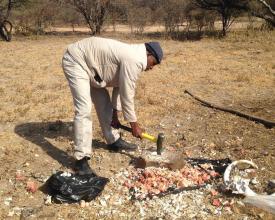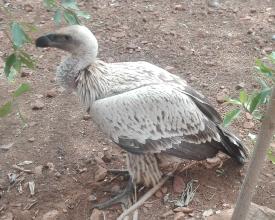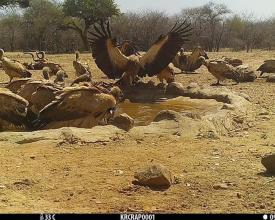Aider les vautours du Cap menacés d'extinction à Tswapong Hills, dans l'est du Botswana

Les vautours du Cap sont vulnérables et endémiques en Afrique australe, et leur reproduction dans l'est du Botswana est entourée de terres agricoles. Nous avons découvert qu'au moins 15 % des poussins naissaient avec des os déformés, signe d'une carence en calcium, ce qui les empêchait de voler. Après une consultation approfondie avec les parties prenantes, nous avons lancé un projet visant à fournir plus de 500 kg de fragments d'os comme supplément de calcium aux vautours pendant la saison de reproduction (mai-novembre 2019). Ce projet fait partie du programme Save Our Species de l'UICN(https://iucnsos.org/initiative/sos-african-wildlife/), cofinancé par l'Union européenne. Les os sont riches en calcium et contribuent donc au développement et à la croissance du squelette. Les mères mangent les os et nourrissent les poussins dans les nids. Le nombre d'oisillons présentant des déformations osseuses a diminué de 58 % au cours de la première année d'intervention, et moins de 5 % des oisillons ont été signalés comme présentant des déformations osseuses par la suite. Nous avons constaté que le projet a été adopté avec succès par la communauté locale et qu'il est toujours en cours avec peu d'intervention de notre part.
Impacts
Impacts sur l'environnement
- Amélioration du succès de la reproduction des vautours du Cap en remédiant aux malformations osseuses des poussins.
- Amélioration du taux de survie de la population de vautours du Cap grâce à l'augmentation du nombre de poussins rejoignant la population.
Impacts sociaux
- Promotion de la participation de la communauté à la conservation des vautours
- Sensibilisation accrue à l'importance des vautours et de leur conservation.
Impacts économiques
- Revenu supplémentaire pour les guides touristiques des gorges
- Amélioration potentielle de l'écotourisme grâce à l'utilisation du site d'alimentation des vautours.


